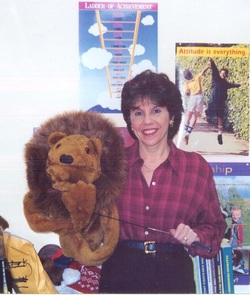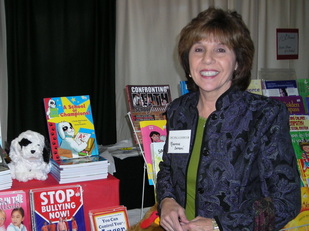Chester and I worked well together!

The first thing I did as an elementary counselor was to buy a big-mouth puppet. "Chester," a big lion puppet, came with me into every classroom -- from Kindergarten to Grade 5! He was a great "attention- getter" and I realized that having a puppet as a teacher assistant was a great way to start off any lesson. Having Chester start the lesson let the students know that they were going to have a "different" lesson. And Chester would always look around the room quietly until all eyes were on him.
I have been told by fellow counselors that they would feel silly or embarrassed to stand in front of their students with a puppet. Well, think about this...as educators, we ask students to take risks every day. We ask them to read in front of the class, or come up to the board and do math problems that they might not know. Doesn't it make sense that we should not be afraid to show students that it is "okay" to take risks or do something that requires courage?
Chester helped me in so many ways. When doing a small group, or in individual counseling, it was often Chester, who could get a children to communicate their feelings. And once when a student locked himself in a stall in the bathroom and refused to come out, it was Chester, who put his head under the stall and asked, "What are you doing in there? Come on out and you can hold me!" (A very special privilege!)
When I got Chester, the directions that came with him said, "Don't try to be a ventriloquist, or the students will be staring at you to try to see your mouth move. If you just let your puppet talk, the kids will be looking at him, not you." Chester sounded a LOT like me, but many students thought that he was the one speaking.
I also came to realize that storytelling is the ultimate teaching tool in reaching children and in helping them understand the natural and logical consequences of making good choices. My stories always taught life lessons and always ended happily. I wanted the kids to learn the lesson right along with the characters in the stories. So, I encourage you to try telling one of my stories instead of reading it. See what happens - a bond forms, as you look around the room, make eye contact and "teach" the lesson is such a meaningful way.
As educators, you have huge power to make a positive impact on the lives of your students. You can teach children that if they keep a positive attitude, and if they set goals and keep striving to reach these goals, they will find success.
But before you can teach this message to children, YOU have to believe it is true! Setting and pursuing your own goals is a way to keep motivation and enthusiasm in your own life and you will be a positive role model for your students.
Being the school motivator, often requires you to put aside your own problems that might be weighing you down. Try very hard to not allow yourself to let your own worries to get the best of you at school. Stand up straight and tall, and help students find their way in life. It's like throwing a pebble into a pond and seeing the ripples continue. You never know who you are changing and you never know the continued effect your influence will have. You are changing the future...one child at a time!
"Nothing great was ever achieved without enthusiasm"
Ralph Waldo Emerson
I have been told by fellow counselors that they would feel silly or embarrassed to stand in front of their students with a puppet. Well, think about this...as educators, we ask students to take risks every day. We ask them to read in front of the class, or come up to the board and do math problems that they might not know. Doesn't it make sense that we should not be afraid to show students that it is "okay" to take risks or do something that requires courage?
Chester helped me in so many ways. When doing a small group, or in individual counseling, it was often Chester, who could get a children to communicate their feelings. And once when a student locked himself in a stall in the bathroom and refused to come out, it was Chester, who put his head under the stall and asked, "What are you doing in there? Come on out and you can hold me!" (A very special privilege!)
When I got Chester, the directions that came with him said, "Don't try to be a ventriloquist, or the students will be staring at you to try to see your mouth move. If you just let your puppet talk, the kids will be looking at him, not you." Chester sounded a LOT like me, but many students thought that he was the one speaking.
I also came to realize that storytelling is the ultimate teaching tool in reaching children and in helping them understand the natural and logical consequences of making good choices. My stories always taught life lessons and always ended happily. I wanted the kids to learn the lesson right along with the characters in the stories. So, I encourage you to try telling one of my stories instead of reading it. See what happens - a bond forms, as you look around the room, make eye contact and "teach" the lesson is such a meaningful way.
As educators, you have huge power to make a positive impact on the lives of your students. You can teach children that if they keep a positive attitude, and if they set goals and keep striving to reach these goals, they will find success.
But before you can teach this message to children, YOU have to believe it is true! Setting and pursuing your own goals is a way to keep motivation and enthusiasm in your own life and you will be a positive role model for your students.
Being the school motivator, often requires you to put aside your own problems that might be weighing you down. Try very hard to not allow yourself to let your own worries to get the best of you at school. Stand up straight and tall, and help students find their way in life. It's like throwing a pebble into a pond and seeing the ripples continue. You never know who you are changing and you never know the continued effect your influence will have. You are changing the future...one child at a time!
"Nothing great was ever achieved without enthusiasm"
Ralph Waldo Emerson
